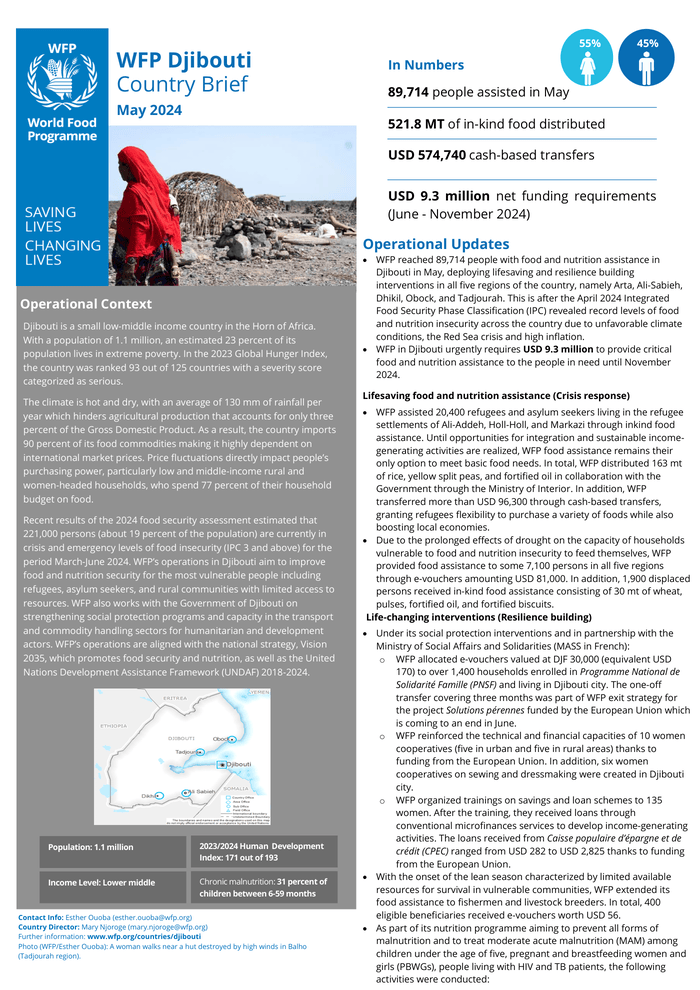Attachments
In Numbers
89,714 people assisted in May
521.8 MT of in-kind food distributed
USD 574,740 cash-based transfers
USD 9.3 million net funding requirements (June – November 2024)
Operational Updates
WFP reached 89,714 people with food and nutrition assistance in Djibouti in May, deploying lifesaving and resilience building interventions in all five regions of the country, namely Arta, Ali-Sabieh,
Dhikil, Obock, and Tadjourah. This is after the April 2024 Integrated Food Security Phase Classification (IPC) revealed record levels of food and nutrition insecurity across the country due to unfavorable climate conditions, the Red Sea crisis and high inflation.
WFP in Djibouti urgently requires USD 9.3 million to provide critical food and nutrition assistance to the people in need until November 2024.
Lifesaving food and nutrition assistance (Crisis response)
WFP assisted 20,400 refugees and asylum seekers living in the refugee settlements of Ali-Addeh, Holl-Holl, and Markazi through inkind food assistance. Until opportunities for integration and sustainable incomegenerating activities are realized, WFP food assistance remains their only option to meet basic food needs. In total, WFP distributed 163 mt of rice, yellow split peas, and fortified oil in collaboration with the Government through the Ministry of Interior. In addition, WFP transferred more than USD 96,300 through cash-based transfers, granting refugees flexibility to purchase a variety of foods while also boosting local economies.
Due to the prolonged effects of drought on the capacity of households vulnerable to food and nutrition insecurity to feed themselves, WFP provided food assistance to some 7,100 persons in all five regions through e-vouchers amounting USD 81,000. In addition, 1,900 displaced persons received in-kind food assistance consisting of 30 mt of wheat, pulses, fortified oil, and fortified biscuits.
Life-changing interventions (Resilience building)
Under its social protection interventions and in partnership with the Ministry of Social Affairs and Solidarities (MASS in French):
WFP allocated e-vouchers valued at DJF 30,000 (equivalent USD 170) to over 1,400 households enrolled in Programme National de Solidarité Famille (PNSF) and living in Djibouti city. The one-off transfer covering three months was part of WFP exit strategy for the project Solutions pérennes funded by the European Union which is coming to an end in June.
WFP reinforced the technical and financial capacities of 10 women cooperatives (five in urban and five in rural areas) thanks to funding from the European Union. In addition, six women cooperatives on sewing and dressmaking were created in Djibouti city.
WFP organized trainings on savings and loan schemes to 135 women. After the training, they received loans through conventional microfinances services to develop income-generating activities. The loans received from Caisse populaire d’épargne et de crédit (CPEC) ranged from USD 282 to USD 2,825 thanks to funding from the European Union.
With the onset of the lean season characterized by limited available resources for survival in vulnerable communities, WFP extended its food assistance to fishermen and livestock breeders. In total, 400 eligible beneficiaries received e-vouchers worth USD 56.
As part of its nutrition programme aiming to prevent all forms of malnutrition and to treat moderate acute malnutrition (MAM) among children under the age of five, pregnant and breastfeeding women and girls (PBWGs), people living with HIV and TB patients, the following activities were conducted:
WFP supplied health centers with around 92 mt of specialized nutritious foods, covering two months of MAM treatment (May and June) for over 3,100 children aged under 6-59 months, 2,500 PBWGs, and 975 HIV/TB patients.
Approximately 5,200 children aged under five and PBWGs at risk of malnutrition received nutritional support with a two-month ration (May and June) of super cereal plus (47 mt distributed).
Eligible parents from Dikhil region were included in the provision of take-home rations. In total, WFP distributed more than 121 mt of super cereal plus and 105 mt of fortified oil to over 7,500 parents of school children in Dikhil, Obock and Tadjourah. This nutritional support benefitted more than 11,300 school children and their families.
Supply Chain
WFP’s sustained efforts to develop the capacities of local food processors resulted in the approval of Golden Africa Djibouti Sarl as one of WFP suppliers of fortified vegetable oil. Based on the results of the 2023 Food System Management System assessment (policies, procedures, production processes, and measures in place to ensure food safety during production), WFP Food Safety assurance teams identified areas for improvement and strengthened the capacity of the local producer to ensure the vegetable oil refined and added with additional nutrients in Djibouti met WFP’s and international standards. Golden Africa Djibouti Sarl already produces 216,000 MT of vegetable oil per year and the significant progress made in enhancing food safety and quality processes is a positive step towards a long-term partnership.
Source link : https://reliefweb.int/report/djibouti/wfp-djibouti-country-brief-may-2024
Author :
Publish date : 2024-06-18 07:00:00
Copyright for syndicated content belongs to the linked Source.
